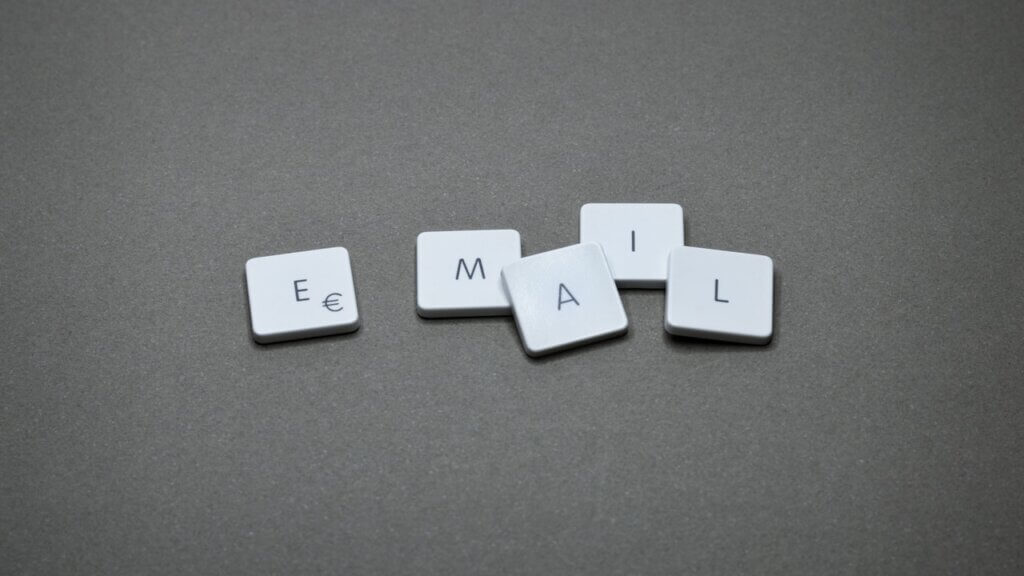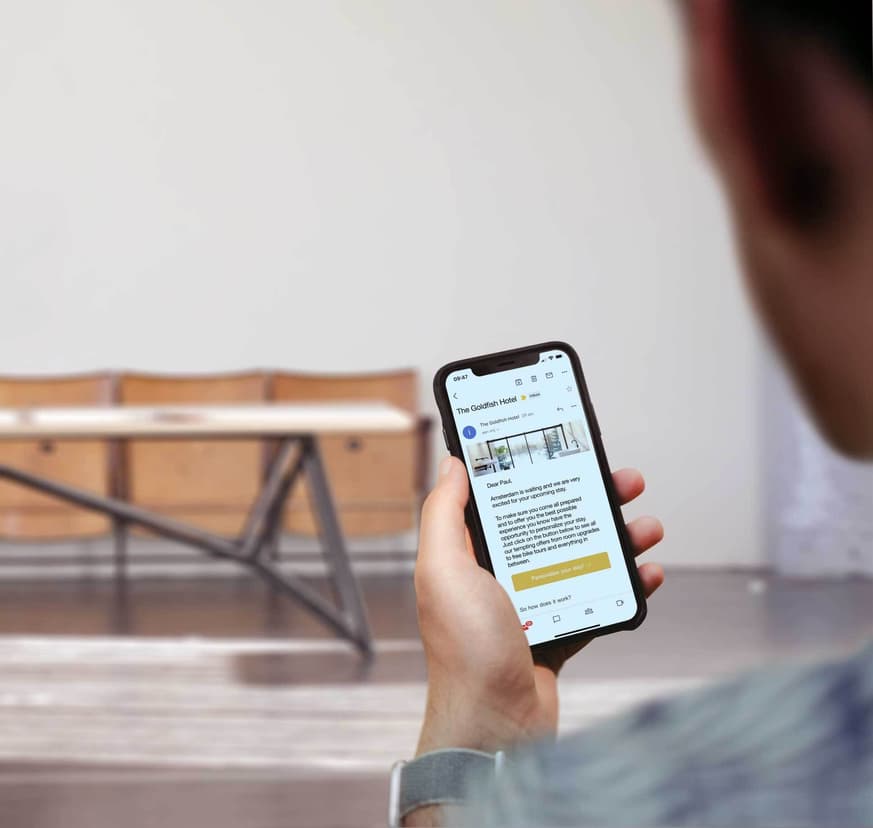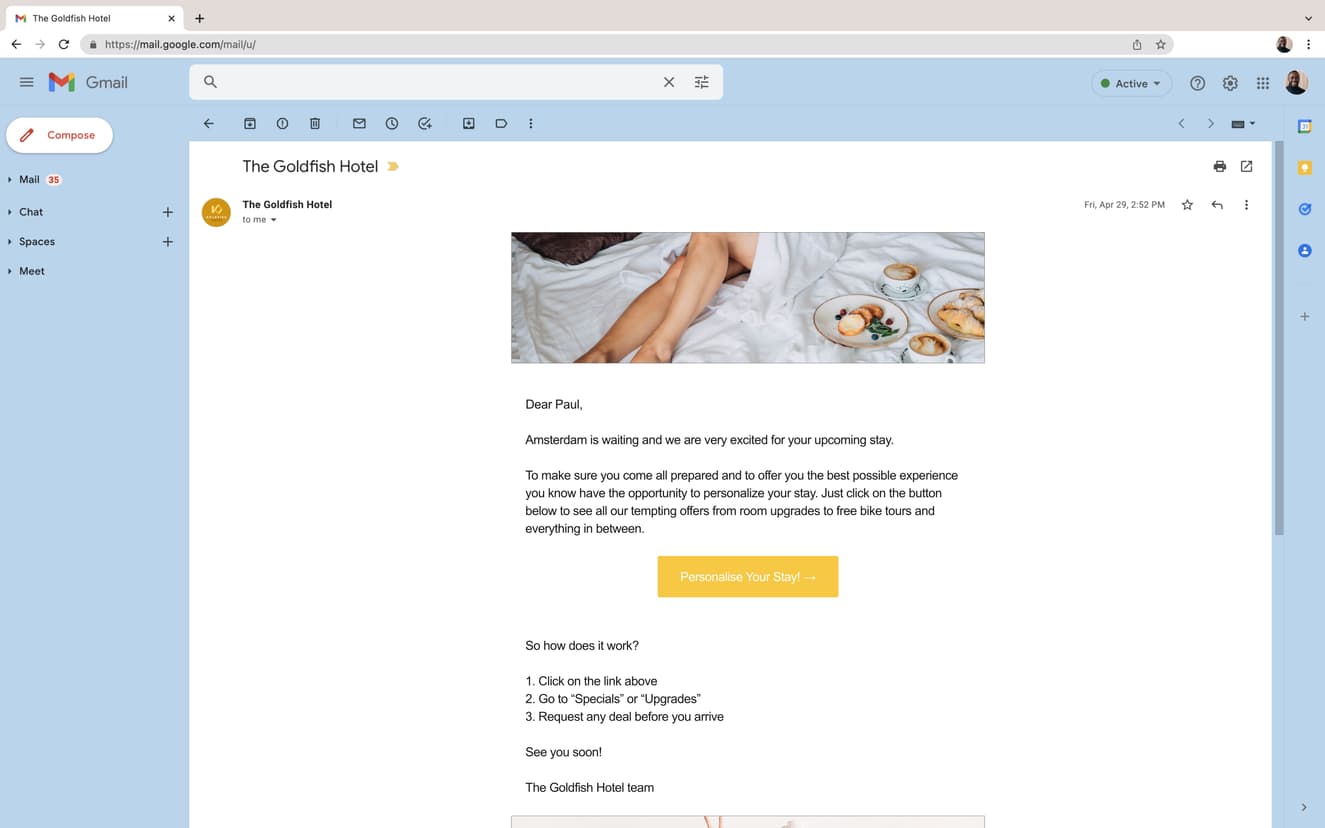
Once someone books a room, you can lean back and wait for them to check in, right?
NB: This is an article from Oaky
Not quite, as the pre-arrival stage is the perfect time to break the ice and build anticipation by sending an enticing hotel pre-arrival email. Hotel pre-arrival emails also offer a fantastic chance to drive incremental revenue. Unfortunately, many hotels overlook these benefits.
Subscribe to our weekly newsletter and stay up to date
That’s a shame because our data shows that targeted offers sent before the guest’s arrival can boost upselling conversion rates by 8.23%.
If you want to learn how to wow guests and drive revenue with pre-arrival emails, you’re in the right place. Read on for our best advice on pre-stay communication.
…but first, polish your booking confirmation email
Apart from the success message on your website or the OTA, guests expect a booking confirmation via email. This gives them peace of mind because it assures them that you’ve received their reservation. It also provides a summary of their booking details. This can come in handy during check-in or when an immigration officer asks where they’re staying.
While its main content isn’t exciting, it doesn’t mean the confirmation email should be boring. It’s the first touchpoint in your guest messaging process, so feel free to make it interesting.
Use it as a chance to share a concise overview of your facilities. For example, include images and links to your restaurant or spa to encourage guests to explore your offering.
What is the difference between the booking confirmation email and the hotel pre-arrival email?
The booking confirmation is the first email your guest receives from you after making a reservation. Its main purpose is to confirm and summarise the booking and outline the hotel policy. Other information about your hotel or local attractions is useful but not the main focus of this email.
Hotel pre-arrival emails are good for building a relationship and getting guests excited about their upcoming stay. Use these messages to share information about your property and its surroundings and learn about their preferences. Ask how you can make their trip more fun, stress-free or memorable to prompt travellers to make requests. Take things a step further with pre-stay surveys if you want to collect more data.
Knowing what your guests are most interested in will make it easier to upsell and cross-sell. Your guests will be able to customise their stay pre-arrival, and you can have everything ready when they check in.
How to put together an effective hotel pre-arrival email
Now, it’s time to look at eight ways you can optimise your pre-arrival communication. Follow these tips, and your guests will be delighted every time they see you in their inbox.
1. Create attractive subject lines
Your email subject lines must be captivating if you want high open rates. Email marketing experts have shared the best practices to improve open rates. Here’s a list of five proven tactics:
- Apply scarcity
If availability is limited for certain room upgrades or services, this can encourage guests to open and book, e.g. “Only two junior suites left for your booked dates.”
- Create a sense of urgency
Telling guests that time is running out creates a fear of missing out (FOMO) and boosts open rates, e.g. “This upgrade offer expires in 24 hours.”
- Personalise your subject lines
This makes your message feel more personal and exciting, e.g. “How would you like a view of the ocean, Sam?”
- Keep it short
Many email clients cut off long subject lines, especially on mobile devices. As a rule of thumb, keep your subject line short and sweet within 50 characters.
- Unleash your creativity
Come up with a cool pun, wordplay or a quirky phrase and then test it to get a feel for which type of subject lines pique your audience’s interest.
2. Personalise your messages
The whole purpose of pre-arrival messages is to build a relationship with your guests. Personalised emails play an important role here. Start with customising the subject line to draw in recipients.
Next, look at your email body and find other instances to include the guest’s name? Can you refer to other trip details, e.g. the stay dates, special requests or offers the guest booked? This makes the message feel more personal and less like a generic email blast.
As a result, more people will read till the end, connect with your brand and explore your service offering.
3. Use attractive design
Keep readability and the overall user experience in mind when designing your email template. Often less is more, and a straightforward layout will be easier on your readers. Many people will skim your message first to see if there’s a topic they want to explore.
Consider this when you format the content. Use different font sizes and bold text to introduce various sections and include a concise description below. When picking the font style and size, go for something clear and easy to read.

Next, add relevant, attractive images that visualise your offer. Compress them to avoid long load times that frustrate readers. Finally, remember that not all email clients display photos and special formatting by default. Save guests trouble and ensure your email’s content and formatting creates a good user experience even without the pictures.
4. Stick with your branding
Both your booking confirmation email and the hotel pre-arrival email are an excellent opportunity to spotlight your hotel’s brand. That’s important for two reasons. First, the more often your guests come into contact with it, the more likely they are to remember it.
Second, brand consistency across your website, social media and channels creates a coherent, reliable experience for your guests.
For this, use your logo, colour scheme, fonts and signature design elements in all your pre-arrival emails. Create message templates in your CRM and email provider to save time and ensure you’re always on brand.
5. Let your guests customise their stay through segmentation
Inform guests about available extras during the pre-arrival phase so they can pick their favourite ones.
Use guest data to segment travellers and determine which offers could be most interesting to them. That allows you to send them a smaller yet more targeted set of deals to choose from. This makes browsing more fun for your guests and will increase your conversion rates at the same time.
An upselling platform like Oaky that automates guest segmentation will get you the best results. For example, Oaky pulls guest data from the property management system (PMS) to group travellers in segments. Then it sends each one a personalised offer selection based on their segment.
6. Automate your emails
Sending each pre-arrival email manually takes a lot of time. You probably wouldn’t be able to offer guests the same level of customisation options that way either. Finally, responding to all your guests’ requests would add another task to your team’s workload. Automating your pre-arrival email outreach addresses these challenges in one go.
For example, an upselling platform like Oaky combines both pre-arrival communication and upselling. First, it pulls guest data from your PMS to personalise the message and deal selection. Then it automatically sends personalised upselling emails at the ideal time during the guest journey.
On top of that, thanks to Oaky’s integration with Duetto, prices for room upgrades are dynamic and follow your revenue management strategy. This helps you boost ancillary revenue without extra hassle.
7. Contact your guests at the right moment of their journey
Pre-arrival emails’ timing can make a big difference in your conversion rates. Oaky has found that sending the first message twelve days before check-in results in the highest CTR of 48% and a conversion rate of 10.6%. Compared to other days, this is nearly double.
Send one follow-up message nine or ten days out to give guests another chance to explore your deals. On average, this results in a 42%/43% CTR and a 12%/11% conversion rate, respectively. Of course, the time of day you send your message is also important. We’ve found that emails sent between 12 PM and 2 PM or at 6 PM have conversion rates between 44% and 53%.
8. Use your guest’s language
The easier you make it for guests to engage with your pre-arrival emails, the better your results will be. Especially if you welcome a lot of international travellers, be aware that they probably don’t all speak your language.
If possible, send them pre-arrival emails in their language to accommodate them. This shows that you’re willing to go the extra mile to make them feel comfortable. It can also increase your conversion rates because guests better understand your offers.
For your inspiration: a hotel pre-arrival email template
Apply the eight tips listed above, and you’re well on your way to creating a brilliant pre-arrival guest experience. Personalisation is crucial for making your messages sound relevant to each traveller.
But of course, strong branding, attractive visuals and your tone of voice are also crucial for building your guest relationship.
Only if you’ve done all that well, you can successfully promote your custom selection of upselling deals. Then, round it all out by adding an enticing call to action button. This will ensure that your guests will have the stay of their dreams while you drive incremental revenue.
If you need some inspiration, check out the pre-arrival email below.

It ticks all the boxes and boasts impressive metrics. The CTR reaches 70%, while conversion rates for add-ons and paid upgrades come to 17.4% and 8.7%, respectively.
If you want similar results, it’s time to outline an action plan for how to optimise your pre-arrival communication and get to work!






